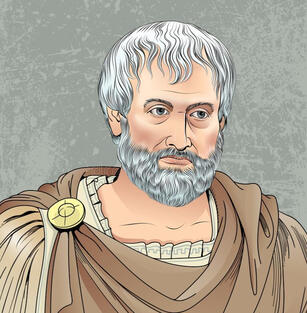
C3 SCIENOPEDIA
BIOLOGY

References:
https://www.ntnu.edu/biology/about-us/what-is-biologyhttps://www.britannica.com/science/biology
The word biology is derived from the Greek words bios meaning “life” and logos meaning “study”. It is defined as the branch that deals with life and vital processes that include living organisms. In simple terms, it is the science of life and living organisms. Biology is the study of life and the mechanisms that sustain it. All of life's physicochemical facets are covered in this field. The field of biology and other scientific disciplines have a lot in common because of the present trend toward interdisciplinary inquiry and the integration of scientific knowledge and investigation from many fields. In disciplines like biochemistry, biomedicine, and biophysics, contemporary principles from other disciplines, for instance, chemistry, medicine, and physics are combined with those from biology.
All Rights Reserved

HISTORY

Aristotle
384 B.C.E. - 322 B.C.E.
Notable contributions in the field of biology:
Aristotle's' zoology and the classification of species was his greatest contribution to the history of biology, the first known attempt to classify animals into groups according to their behavior and, most importantly, by the similarities and differences between their physiologies.
References:
http://www.eolss.net/sample-chapters/c03/e6-71-01-01.pdf)https://www.encyclopedia.com/religion/encyclopedias-almanacs-transcripts-and-maps/biology-i-history
Biology as a field of science has come a long way ever since the beginning of time. With the exception of technology, the modern biology that we all know to exist isn’t as far as it would be to the traditional/ancient biology.
The science of Biology was invented by Aristotle in the span of 384-322 BC.
His failed observations in plant species made him transition to performing experiments on animal bodies, specifically catfishes and sharks. Even though many Greek philosophers have been interested and were already doing such work in speculating the origin of Earth and its living organisms, no one was claimed to be successful in proving such theories and conjectures by using empirical evidence. Although Aristotle cannot account for the entirety of biology’s development as an area of scientific evaluation, he can still be credited for making the way and leading the start of ancient biology. There’s a massive possibility that the average person with decent knowledge of the subject ‘biology’ would think that it all started because of some discovery in relation to human anatomy. However, animal anatomy paved the way for biology to take its first steps as an area of scientific interest.
The writings of the ancient Greek philosopher Aristotle (c. 384–322 bc), in particular, are where biology first emerged as a discipline that sought knowledge of living things for their own sake rather than to advance human welfare.
Greece fell to the Roman legions around the middle of the 2nd century b.c.
The Romans made political contributions, but their main interest in science was in its practical applications.
As a result, biology promoted both medicine and agriculture due to how crucial they were to the welfare of the army and the empire. Pliny, Dioscorides, and Galen are noteworthy.